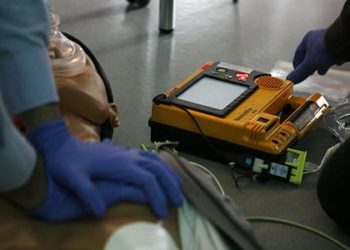Greater decline in chest compression quality in children vs. adults
Feb 25th – The proportion of adequate chest compressions diminishes for both adult and child simulations, though this occurs more rapidly on pediatric mannequins.
[tabs tab1=”2MM Rundown” tab2= “2MM Full Report”]
[tab]
Image: PD
1. Proportion of adequate chest compressions diminishes more rapidly in simulated single provider resuscitation on pediatric mannequins.
2. After 120 seconds of CPR, mean adequate chest compressions was less than 69% in both pediatric and adult simulated resuscitation.
3. There was no significant difference in work between pediatric and adult resuscitation efforts, although there was a greater average force applied in adult compressions.
Published today in Pediatrics, this study quantitatively evaluates the features of pediatric and adult resuscitation efforts, including the quality and work of chest compressions and rescuer fatigue. The data are limited in that they were generated in an artificial code situation, which may underestimate the effort a provider would expend in a genuine emergency situation. In addition, the simulation relies heavily upon artificial models of pediatric and adult body habitus, which may not accurately reflect chest wall compliance. Despite these limitations, the study shows that both groups experience a significant decrease in resuscitation quality after 2 minutes of compressions, supporting AHA recommendations for provider exchange every 2 minutes during resuscitation efforts.
Interestingly, self-reported fatigue was similar across both groups, but did not match measured chest compression quality deterioration, suggesting that providers underestimate their fatigue during resuscitation efforts. The data also demonstrate that there is a more rapid decline in the quality of chest compressions in pediatric resuscitation. The authors hypothesize that this finding may be due to underestimation by rescuers of the work required to maintain adequate compressions in the pediatric patient, especially important considering the disparity in pediatric CPR survival outcomes both in and outside of the hospital compared to adults.
Click to read the study in Pediatrics
[/tab]
[tab]
Image: PD
1. Proportion of adequate chest compressions diminishes more rapidly in simulated single provider resuscitation on pediatric vs. adult mannequins.
2. After 120 seconds of CPR, mean adequate chest compressions was less than 69% in both pediatric and adult simulated resuscitation.
3. There was no significant difference in work between pediatric and adult resuscitation efforts, although there was a greater average force applied in adult compressions.
This [prospective, randomized crossover] study evaluated 45 care providers at the Children’s Hospital of Philadelphia delivering 10 minute cycles of CPR on both adult and pediatric manikins, and tracked quality, force, and work of compressions. In both groups, the quality of chest compressions decreased over the 10-minute resuscitation period; however, a more rapid decline in mean adequate chest compressions per minute was seen in the pediatric resuscitation group (p=0.02). Mean adequate chest compressions was less than 69% in both groups after 2 minutes. Self-reported fatigue did not match measured chest compression quality deterioration. Work expenditure across both groups was not statistically different, but there was greater force employed during adult resuscitation.
In sum: Published today in Pediatrics, this study quantitatively evaluates the features of pediatric and adult resuscitation efforts, including the quality and work of chest compressions and rescuer fatigue. The data are limited in that they were generated in an artificial code situation, which may underestimate the effort a provider would expend in a genuine emergency situation. In addition, the simulation relies heavily upon artificial models of pediatric and adult body habitus, which may not accurately reflect chest wall compliance. Despite these limitations, the study shows that both groups experience a significant decrease in resuscitation quality after 2 minutes of compressions, supporting AHA recommendations for provider exchange every 2 minutes during resuscitation efforts.
Interestingly, self-reported fatigue was similar across both groups, but did not match measured chest compression quality deterioration, suggesting that providers underestimate their fatigue during resuscitation efforts. The data also demonstrate that there is a more rapid decline in the quality of chest compressions in pediatric resuscitation. The authors hypothesize that this finding may be due to underestimation by rescuers of the work required to maintain adequate compressions in the pediatric patient, especially important considering the disparity in pediatric CPR survival outcomes both in and outside of the hospital compared to adults.
Click to read the study in Pediatrics
By Emilia Hermann and Devika Bhushan
More from this author: AAP urges bottle feeding over breastfeeding in mothers with HIV, Pediatric influenza burden remains high despite new vaccination recommendations, Community hospitals rely on greater CT use to diagnose pediatric appendicitis, Cow’s milk consumption linked to increased vitamin D and decreased iron stores in early childhood, Delayed growth seen in children with congenital heart disease, No association found between maternal NSAID use and newborn pulmonary hypertension
© 2013 2minutemedicine.com. All rights reserved. No works may be reproduced without written consent from 2minutemedicine.com. Disclaimer: We present factual information directly from peer reviewed medical journals. No post should be construed as medical advice and is not intended as such by the authors or by 2minutemedicine.com. PLEASE SEE A HEALTHCARE PROVIDER IN YOUR AREA IF YOU SEEK MEDICAL ADVICE OF ANY SORT. Content is produced in accordance with fair use copyrights solely and strictly for the purpose of teaching, news and criticism. No benefit, monetary or otherwise, is realized by any participants or the owner of this domain.
[/tab]
[/tabs]






